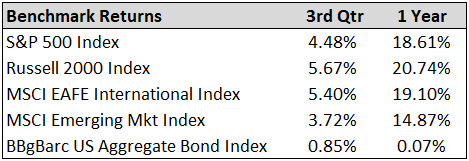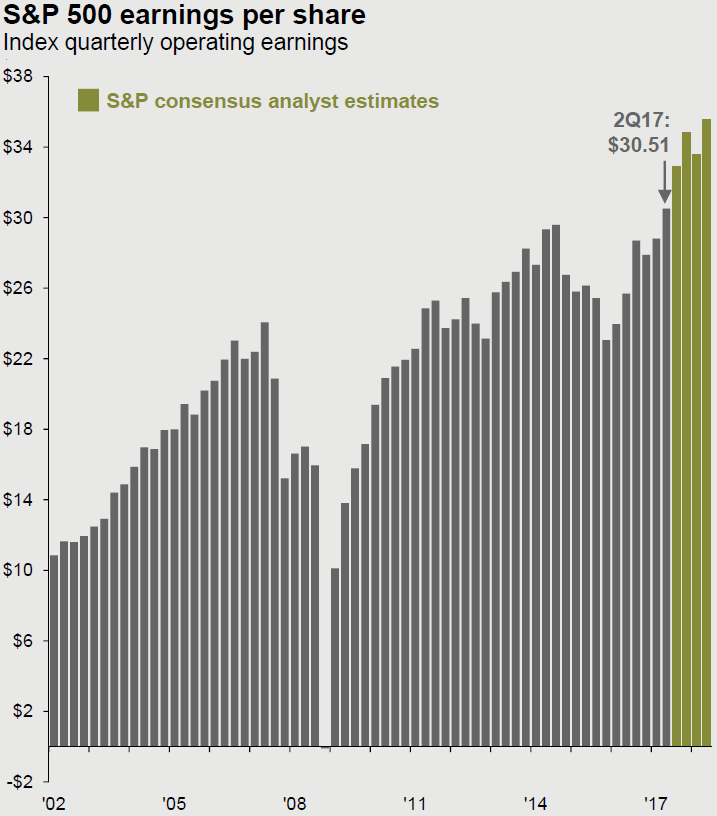The Long and Short of It:
 Markets continue to rise despite political unrest, natural disasters, and the stock market hitting all-time highs.The strengthening economy could cause inflation which could lead to higher interest rates.
Markets continue to rise despite political unrest, natural disasters, and the stock market hitting all-time highs.The strengthening economy could cause inflation which could lead to higher interest rates.
3rd Quarter Review
Stocks continued to rise in the third quarter. Small US stocks and developed international markets lead the way, but essentially all major areas of the stock market rose at a good pace. Bonds started the quarter off strong, but gave back most of their gains after the Federal Reserve (FED) indicated they would start quantitative tightening. In this quarter’s market commentary, we answer the question “How does the stock market continue to go up?” and we look at the ramifications of economic growth on future interest rates and bond performance.
How Does the Stock Market Continue to Rise?
Many clients are currently asking: “How does the market continue to go up despite all the bad things going on in the world?” One may think that with all the geopolitical unrest with North Korea and all the natural disasters (hurricanes and Earthquakes), that the market would fall. Some people ask from another angle, “With the market this high shouldn’t it pullback soon?” Let’s tackle each of these questions one at a time to gain a better understanding of how the market works and why the market continues to rise.
Geopolitical Unrest:
It is certainly scary to think of what would happen if North Korea and the US entered a military conflict, especially one with nuclear weapons. However, the geopolitical analysts that we follow are stating that the odds of entering a military conflict are very low. Since starting in the business in the late 90’s I can remember seeing news reports about North Korea testing missiles and nothing has ever come from it other than saber-rattling (flamboyant display of military power). I think the same holds true today except the sabers are louder! And even if we did go to war with North Korea, history has shown that markets usually do well during war times. During a war, governments spend more and manufacturing increases.
Natural Disasters:
Historically, aside from the obvious emotional and personal challenges created by natural disasters, such occurrences only have a very short-term effect on the economy and markets. Local economies do suffer in the immediate aftermath of a natural disaster from loss of productivity and the cost to repair the damage. However, there is usually a strong rebound in the local economy from the additional construction and the sale of building materials. 
![]() Also, federal and/or state authorities usually provide some type of economic relief in the weeks and months following the event.
Also, federal and/or state authorities usually provide some type of economic relief in the weeks and months following the event.
Valuations:
One would think if stocks continue to go up they would become more expensive, but that isn’t always the case from a valuation standpoint. If earnings (profits) of companies are increasing at a faster rate than their share price, then from a price to earnings (P/E) standpoint that stock becomes cheaper. This dynamic is portrayed by the most recent rally. Year over year, earnings per share for the stocks in the S&P 500 index have recently hit all-time highs and are estimated to continue to rise at a good pace over the next year (see chart on right). Stocks prices and earnings are highly correlated, so it is not surprising that stocks are also hitting an all-time high.
Economy:
Another factor helping markets around the world is the growth of the global economy. All of the largest countries’ economies are growing, as measured by Purchasing Managers’ Index for manufacturing (PMI) – even Greece is expanding! In fact, the Global Purchasing Managers’ Index is showing its highest reading since 2011 (see chart below). To provide context, PMI readings above 50 show expansion.

Factoring in the above points, one can see why and how the markets continue to rise despite issues with North Korea, Natural Disasters, and setting new highs. At some point, it is certainly possible for the markets to become overheated, but as of now it seems as if the markets still have room to run.
Ramifications of Economic Growth on Interest Rates
While the stock market has benefited from a strengthening economy, a potential consequence is inflation followed by rising interest rates. The Federal Reserve (FED) and major central banks of developed countries have been battling low inflation and deflation for nearly 10 years. They have thrown everything including the kitchen sink (Quantitative easing, negative interest rates, etc…) at the problem to promote inflation. Now as economies around the world finally start to heat up, they may have to battle the opposite problem. From July of last year to July of this year, inflation in developed markets has gone from around 0.5% to 1.5%. While inflation at 1.5% is still considered historically low the trend is going up. The FED has noticed this trend, and is now trying to front-run inflation by increasing interest rates and using quantitative tightening. Both tactics can put upward pressure on interest rates. This is important as certain areas of the stock and bond market can be affected by rising interest rates. Typically, companies that hold high amounts of debt (REIT’s, Utilities, and Telecoms) can struggle during a rising interest rate environment as their debt gets more expensive to service (*side note: variable rate loans on personal debt can become more expensive and should be paid off as soon as possible). Bonds also tend to be negatively affected by rising rates, especially if they are longer term bonds. On the positive side, financials tend to perform better during a rising interest rate environment as they can make larger profits on loans and money markets. As active money managers, we try to overweight areas that we believe will perform well and underweight weaker areas. As such we are underweight REIT’s, utilities, telecoms, and overweight financials on the stock side of our portfolios. On the bond side of our portfolios, we hold a smaller overall percentage of bonds and a shorter duration than their respective benchmarks.
Going Forward
The market continues to move higher despite political unrest with North Korea, major natural disasters, and the stock market hitting all-time highs. We believe the move higher is justified since the chances of a military conflict with North Korea is low. While natural disasters are a short-term negative, they come with longer-term economic positives during the rebuild. Most importantly the markets’ move higher is justified, because earnings continue to strengthen and the global economy continues to improve. While the strengthening economy is a welcome sign, a potential longer-term affect could be inflation and rising rates. As such, we have positioned our portfolios for a rising rate environment. We are constantly monitoring the markets, economies, interest rates, currencies, sentiment, and many other indicators to try to stay ahead of the markets as we look to preserve and grow our client’s wealth. Our investment philosophy is to manage risk first in efforts to avoid a major loss, as we seek to outperform markets over a full cycle net of our management fee. We appreciate your trust and confidence in us!
Written by: Jason Martin, CFP®, CMT, Chief Investment Officer Allgen Financial Advisors, Inc.; Paul Roldan, Chief Executive Officer; Christina Shaffer, Junior Analyst
Important Disclosures: The information provided here is of a general nature and is not intended to answer any individual’s financial questions. Do not rely on information presented herein to address your individual financial concerns. Your receipt of information from this material does not create a client relationship and the financial privileges inherent therein. If you have a financial question, you should consult an experienced financial advisor. Moreover, the hiring of a financial advisor is an important decision that should not be based solely upon blogs, articles, or advertisements. Before you hire a financial advisor, you should request information about the financial advisor’s qualifications and experiences. Past performance is no guarantee of future results. All expressions of opinion are subject to change without notice in reaction to shifting market conditions. Data contained herein from third party providers is obtained from what are considered reliable sources. However, its accuracy, completeness or reliability cannot be guaranteed. Examples provided are for illustrative (or “informational”) purposes only and not intended to be reflective of results you can expect to achieve. Allgen Financial Advisors, Inc. (Allgen) is an investment advisor registered with the SEC. Allgen does not provide personal financial advice via this material. The purpose of this material is limited to the dissemination of general information regarding the services offered by Allgen. It is not intended to be a solicitation or offer to sell investment advisory services to residents of any state in which Allgen is not currently authorized to do so. The Disclosure Brochure, Form ADV Part II, which details business practices, services offered, and related fees of Allgen, is available upon request.





